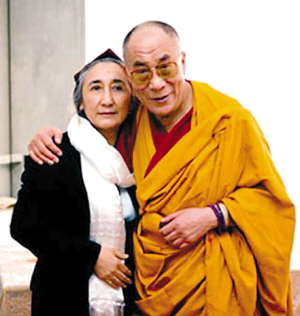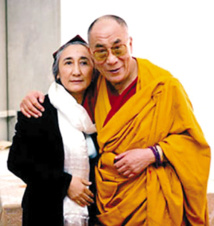He "inspires us to speak up for the freedom and dignity of all human beings," Obama said before an audience of around 3,000 people.
It is the first time the two men -- both Nobel peace laureates -- have been seen together in public.
Three previous encounters have been held behind closed doors -- and outside the Oval Office -- to avoid risking relations with China.
There had been much speculation about whether a meeting would actually take place, with the White House keen to play down talk of any formal sit-down.
Beijing accuses the Dalai Lama of seeking to split Tibet from the rest of China and calls him a "wolf in sheep's clothing."
It vigorously lobbies against foreign leaders meeting the Dalai Lama "in any form."
But during Thursday's prayer breakfast, Obama and the Dalai Lama saluted each other across a plush ballroom.
Wearing his familiar maroon robes, the Dalai Lama was not seated at the head table with Obama and other speakers, but was a short distance away from the dais.
The Buddhist leader put his hands together, bowed and made a peace sign with his fingers as he was acknowledged by hosts.
Obama placed his hands together in response.
- Complaints from Beijing -
Even before the encounter, China had decried interference in its domestic affairs.
"We hope that the American side will act upon its commitment on Tibet-related issues and properly deal with relevant issues in keeping with the overall interests of bilateral relations," said a foreign ministry spokesman.
The government-published China Daily newspaper said: "Should a president of the United States meet with the Dalai Lama, it will unquestionably step on China's toes and therefore cast a shadow over US-China relations.
"Obama is acquiescing to the Dalai Lama's attempt to split Tibet from China."
Since becoming president, Obama has made a "pivot to Asia" a cornerstone of his foreign policy.
Although Thursday's meeting will certainly draw China's ire, the concrete consequences remain unclear.
The Dalai Lama has lived in exile in India since 1959 after a failed uprising in Tibet.
More than 130 ethnic Tibetans have set themselves on fire since 2009 in protest at Beijing's rule, campaign groups and overseas media have said. Most of them have died.
The International Campaign for Tibet welcomed Obama's comments.
"It is the first time that the Dalai Lama and a US President have been present together at a public event since the Tibetan religious leader was awarded the Congressional Gold Medal in 2007."
The Dalai Lama then appeared next to George W. Bush.
---------------------------------------------------------------------------------------------------------------
It is the first time the two men -- both Nobel peace laureates -- have been seen together in public.
Three previous encounters have been held behind closed doors -- and outside the Oval Office -- to avoid risking relations with China.
There had been much speculation about whether a meeting would actually take place, with the White House keen to play down talk of any formal sit-down.
Beijing accuses the Dalai Lama of seeking to split Tibet from the rest of China and calls him a "wolf in sheep's clothing."
It vigorously lobbies against foreign leaders meeting the Dalai Lama "in any form."
But during Thursday's prayer breakfast, Obama and the Dalai Lama saluted each other across a plush ballroom.
Wearing his familiar maroon robes, the Dalai Lama was not seated at the head table with Obama and other speakers, but was a short distance away from the dais.
The Buddhist leader put his hands together, bowed and made a peace sign with his fingers as he was acknowledged by hosts.
Obama placed his hands together in response.
- Complaints from Beijing -
Even before the encounter, China had decried interference in its domestic affairs.
"We hope that the American side will act upon its commitment on Tibet-related issues and properly deal with relevant issues in keeping with the overall interests of bilateral relations," said a foreign ministry spokesman.
The government-published China Daily newspaper said: "Should a president of the United States meet with the Dalai Lama, it will unquestionably step on China's toes and therefore cast a shadow over US-China relations.
"Obama is acquiescing to the Dalai Lama's attempt to split Tibet from China."
Since becoming president, Obama has made a "pivot to Asia" a cornerstone of his foreign policy.
Although Thursday's meeting will certainly draw China's ire, the concrete consequences remain unclear.
The Dalai Lama has lived in exile in India since 1959 after a failed uprising in Tibet.
More than 130 ethnic Tibetans have set themselves on fire since 2009 in protest at Beijing's rule, campaign groups and overseas media have said. Most of them have died.
The International Campaign for Tibet welcomed Obama's comments.
"It is the first time that the Dalai Lama and a US President have been present together at a public event since the Tibetan religious leader was awarded the Congressional Gold Medal in 2007."
The Dalai Lama then appeared next to George W. Bush.
---------------------------------------------------------------------------------------------------------------









 Home
Home Politics
Politics











